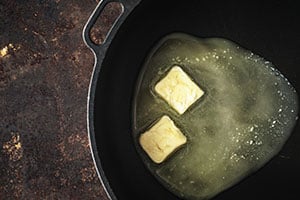Looking to make the most of your dairy products? Here are the best tips and tricks for purchasing, storing and cooking with dairy foods.
Milk
Adding milk as an ingredient will make your foods richer and more nutritious, but make sure you’re properly storing milk to get the most out of it!
Purchasing and Storing
Buy milk and other dairy products toward the end of your shopping trip so that they stay cold. Store milk and other dairy products in the refrigerator below 40°F, but don’t store milk in the refrigerator door, where it is susceptible to warmer air from opening and closing the door. Remember to open new milk containers in the same order in which you bought them — first in the refrigerator, first out of the refrigerator!
To maintain freshness, keep milk stored in its original container. Milk that has been poured out of its container should never be poured back into the original container. Sometimes milk can absorb other flavors while stored in the fridge, but it’s still safe to drink! Keep the container securely closed to help keep this from happening.
Cooking
Use milk instead of water to make creamier canned soups and more nutritious hot chocolate. Using milk can also add richness, tenderness and moisture to bread dough and other baked goods. Cook fluffier scrambled eggs and omelets by whisking about 2 tablespoons of milk into each beaten egg!
Cheese
The amount of time and ways that you can store cheese depends on the type. Follow these tips to store cheese correctly, and don’t forget to add cheese to your favorite dishes!
Purchasing and Storing
Hard cheese, like Cheddar, Gouda, Edam and Swiss, can last for 3-4 weeks tightly wrapped in the refrigerator after opening. It’s okay to freeze hard cheese, but the texture and taste may lose quality after time. Hard cheese can last 3-4 weeks tightly wrapped in the refrigerator, and you can remove mold from hard cheese by cutting a one-inch square around it — the rest is safe to eat!
The softer the cheese, the shorter the shelf life — cream cheese can last for up to two weeks, while ricotta and cottage cheese last only one week. Pregnant women, young children, the elderly and people with weakened immune systems should not eat unpasteurized cheeses or soft cheeses like camembert, brie, blue-veined, etc. Processed cheese spread can keep for 3-4 weeks in the refrigerator after being opened.
Cooking
When preparing dishes using cheese, add the cheese at the end of the preparation, especially in sauces and soups, and sprinkle grated/shredded cheese in the last 10 minutes when baking dishes and casseroles. When cooking with cheese on the stovetop, cook cheese over low to medium heat, as cooking over high heat for long periods of time will cause the cheese to separate, and add cheese to your burger about 2 minutes before you remove the meat from the heat in order to assure proper melting.
Yogurt
Yogurt is a great ingredient to use when cooking and baking! You can substitute Greek yogurt for ingredients like oil or sour cream, as long as it hasn’t expired.
Purchasing and Storing
Once the package has been opened, yogurt can be kept for a few days if it is stored with the foil seal re-sealed (or in a tightly closed container) to keep out moisture and other contaminants, but only use yogurt by the expiration date noted on the container. The shelf life of yogurt can be extended by 1-2 months if stored in a freezer; however, you may notice a different look and texture once thawed.
Cooking
Cut down on the amount of oil in your recipe by substituting half of the amount of oil with 3/4 the amount of yogurt. If you heat yogurt too quickly, it will separate into curds and whey, and over-stirring yogurt may cause it to break down and thin out. Fold yogurt into your recipes to maintain its rich and creamy consistency!





